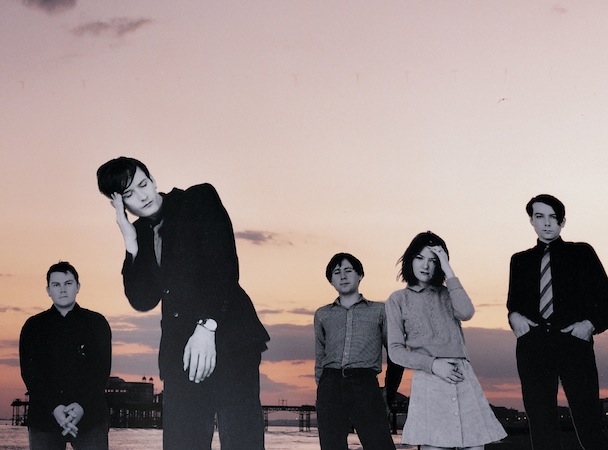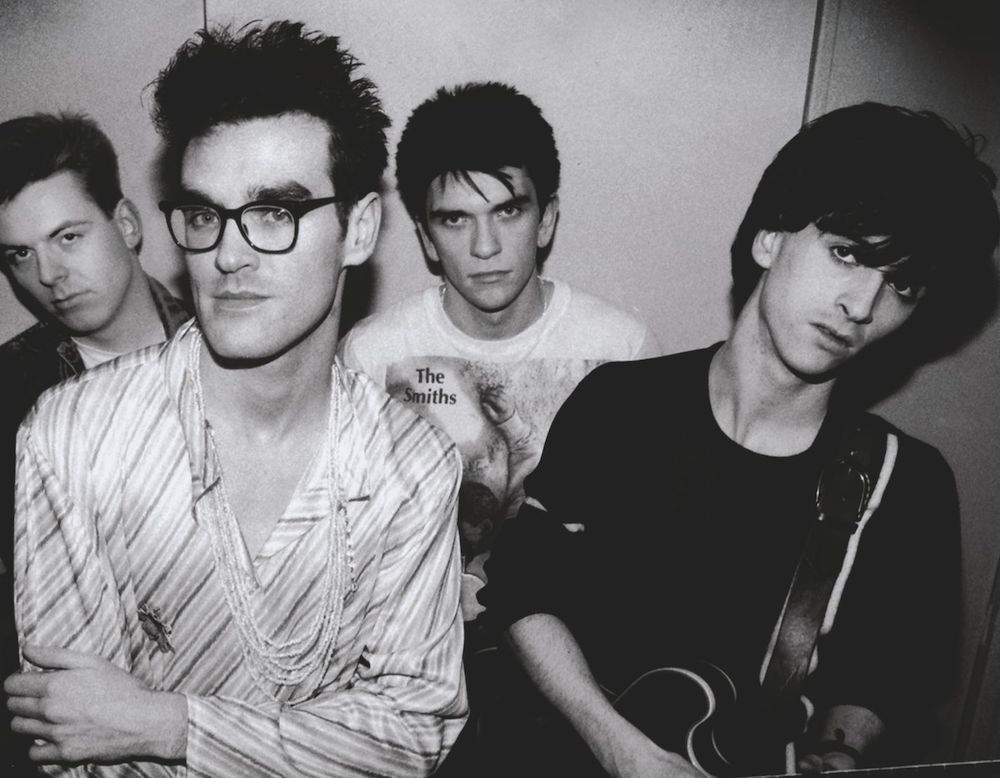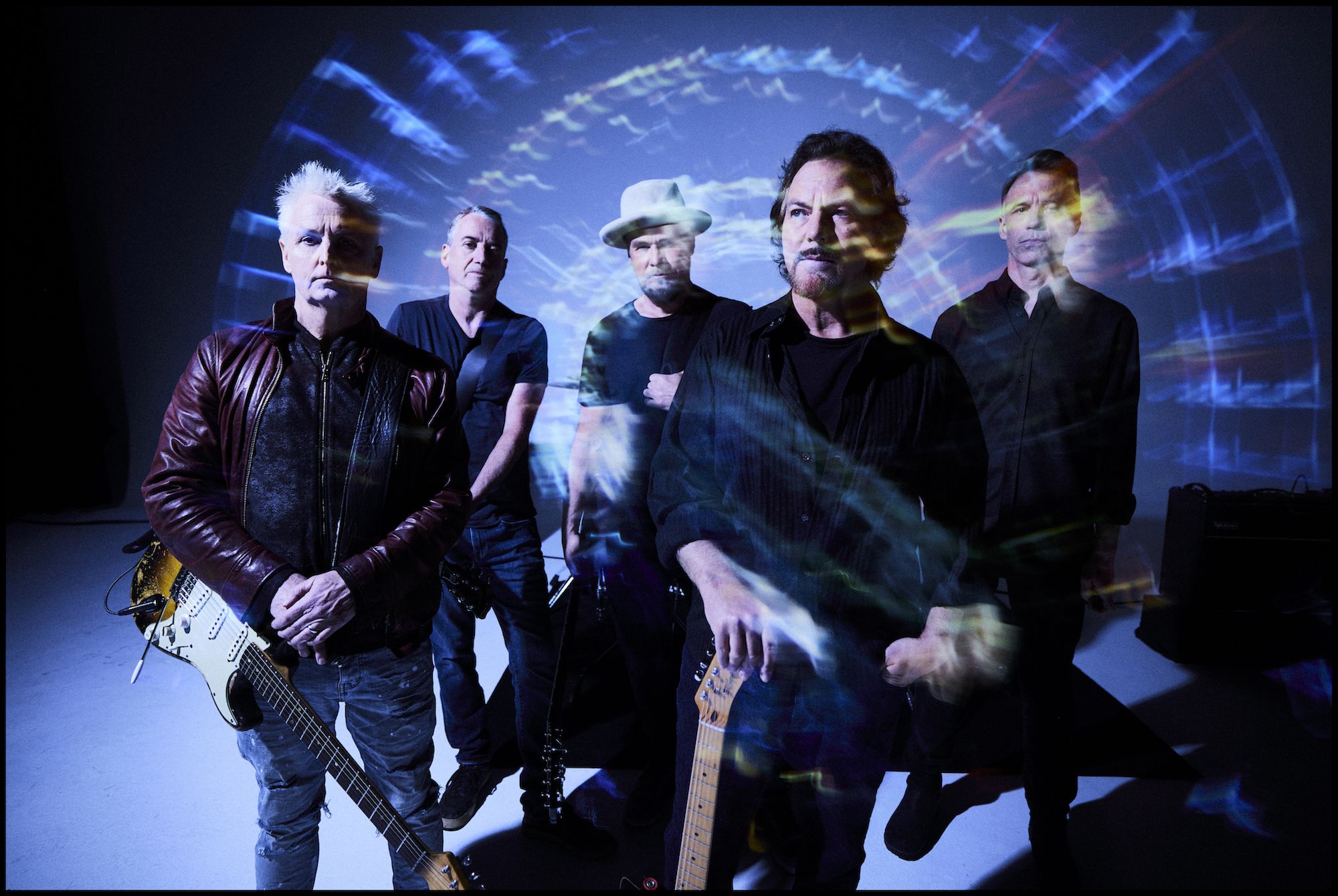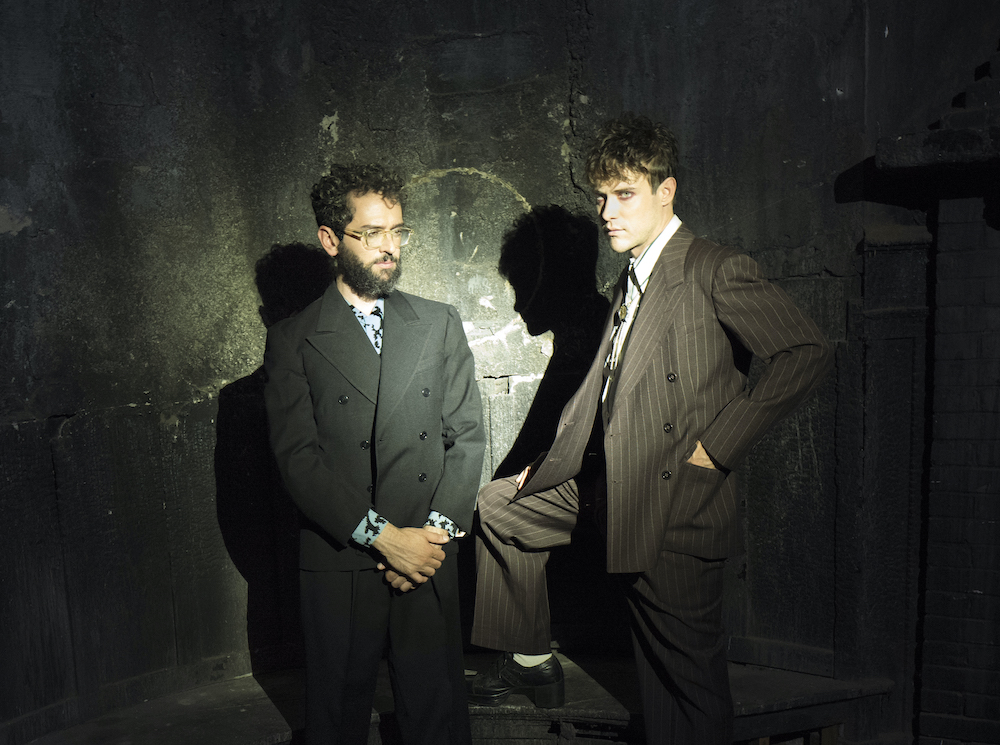Way back before poptimism became a thing that went beyond anti-rockism and into the territory of taking every sound ever very seriously -- I am still not on board with the '70s schmaltz-rock moments of Random Access Memories -- Pulp was a huge amalgam of uncool things. Grunge still reigned here while over in England Madchester yielded to artists like Oasis and Blur that looked toward the great British pop artists of the '60s and the great British punks of the late '70s. As all that went on, Pulp slowly rose out of years of obscurity, their literary and gawky frontman Jarvis Cocker, not yet anointed as the sex symbol he'd become, peddling a mix of disco and cheesy '80s synth sounds and a decent helping of Scott Walker idol worship for good measure. Having once put his band on hiatus to go to art school, Cocker was the kind of guy who understood how to do a heady mix of high and low art. Somehow, Pulp looked to some weirder touchstones than the Kinks and the Beatles and the Stones, and yet after a while still wound up one of the artists that defined their generation.
Even in their ascendency, Pulp always seemed anomalous in the Britpop landscape. For one thing, so much of Britpop was overwhelmingly boyish, at least in the the beginning of its mid-'90s peak. Oasis were busy fulfilling all of the juvenile tropes of a wild young rock 'n' roll band, and Damon Albarn had a sort of angst-ridden petulance about him in his younger days. By contrast, Pulp had been around in varying forms since the early '80s, only to finally figure out their identity around '93 or so, the year Jarvis Cocker turned 30. That only made him four years older than Albarn and three older than Noel Gallagher, but it was enough of a gap to suggest a certain mature wit and outlook. From those early days of their second go-round, Pulp always seemed to be grappling with pretty adult themes, topics maybe not absent from the work of the other Britpop stars, but certainly dealt with in ways wiser and more experienced. In Pulp's songs, sex was dirtier and less satisfying, relationships perpetually fractured and only occasionally redeemed, and the characters treated more acerbically but also not without the sensitivity of stepping back and seeing a wider narrative.
While they initially seemed out of step with the larger musical scene, Pulp's trajectory did wind up following the pattern of many of the other major British bands (Britpop and not) of the '90s. There was the one-two punch of classic, career-defining records: Pulp's His 'n' Hers in '94 and Different Class in '95, Oasis' Definitely Maybe in '94 and (What's The Story) Morning Glory? In '95, and Blur's Modern Life Is Rubbish in '93 and Parklife in '94, or, depending on who you're talking to, The Great Escape in '95. Then the wave of either over-the-top or more "difficult" follow-ups arrived. Oasis went full classic rock excessive with the cocaine bloat of Be Here Now. Spiritualized and The Verve offered up expansive visions of everything they had been about up until that point while also breaking new ground with Ladies and Gentlemen We Are Floating In Space and Urban Hymns respectively, both also '97. Radiohead Phase 1 peaked with an existential grapple with modern life on OK Computer in 1997.
It was Blur who actually wound up following a similar path as Pulp, with each having had a quintessentially English pop sound (they shared debts to Bowie, for one thing), and each making frazzled comedown records. Blur went distorted and druggy and heartbroken twice-over, with 97's Blur and 99's 13, while Pulp finally offered up one world-wearied gasp of a successor to Different Class in the form of 1998's This Is Hardcore. After that, everything got fragmented and anything any of these artists did had little to do with the other, whether it was Oasis making a bunch of records only diehard fans cared about, or Albarn moonlighting in the genre-hopping Gorillaz and finding more success in America than he had with Blur. Pulp released We Love Life in 2001, an album that musically had little to nothing to do with the material that had made them famous.
On that note, I should take a moment to acknowledge We Love Life. It's a gorgeous, expansive album that doesn't seem to get its due when people talk about Pulp. Maybe it just seems temporally removed from their heyday, or maybe its sonic divergence was a turn off for some listeners. I tried to get a song from it onto this list, but just couldn't fit it. The strength of their three album run from '94 to '98 is just too overpowering. Like so many of the best British artists from around that time, it seems once things clicked Pulp just churned out not only several classic albums in succession, but also a huge collection of b-sides that, as it goes, many bands would die to have as their a-sides. Consequently, no b-sides made this list either, even though I'm a big fan of the deep cuts; for starters, I'd highly recommend you check out the This Is Hardcore b-side "It's a Dirty World," which probably should've made the record. At any rate, you can pick ten songs from each of those mid- to late-'90s albums and easily have a defensible Top Ten. As the band continues to dangle the idea of a James Murphy-produced comeback album out in the distant ether, here's a celebration of Pulp's history with ten of my favorites.
10. "F.E.E.L.I.N.G.C.A.L.L.E.D.L.O.V.E." (from Different Class, 1995)
There was a real war going on between whether it was going to be "F.E.E.L.I.N.G.C.A.L.L.E.D.L.O.V.E." or "Sorted for E's & Wizz" that made it on this list and the latter almost won based purely on that awesome synth thing that happens about two and a half minutes in. Ultimately, I had to side with this. It's one of my early favorites by Pulp and it happens to be one of the most surreptitiously (and successfully) bizarre songs they did. In some other circumstance, with different lyrics, one would imagine the spoken verses of "F.E.E.L.I.N.G.C.A.L.L.E.D.L.O.V.E." would be intended to be seductive. Here they're alternatively distraught and smitten, the narrator sounding as if he's coming down from a bad trip as well as a bad relationship, but really just has a bad case of obsession. Unnerving violin squeals and distant percussion linger at the edge of the verses as Cocker delivers some of his best lyrics. Eventually, it bursts into the chorus with near-theatrical drama, a catchy synth riff riding under evocations of the title that might suggest the narrator being overwhelmed by his new feelings, but in kind of a positive way. As with most Pulp songs, it's not as simple as that, and you can't help but feel like the cycle will continue and the narrator will soon find himself as wrecked as he was when the song began.
9. "David's Last Summer" (from His 'n' Hers, 1994)
I started listening to Pulp, fittingly, when I bought Different Class the first time I visited England. Less fittingly, the point where I got really obsessed with them was during the particularly brutal winter of my sophomore year of college, during which I used to walk around Manhattan late at night listening to His 'n' Hers. Within that context, the opening of "David's Last Summer" used to seem off; its initially bouncy rhythm and Jarvis' spoken word delivery struck me as quirky for bitter winds and snow. This was before I'd listened deeper, discovered the category of "long, multi-part, partially spoken-word Pulp songs," like the haunting and overlooked "Wickerman." "David's Last Summer" eventually became one of the best songs for those walks, chiefly because I realized it was one of the most unsettling Pulp songs out there. All of Pulp's really long songs have a graceful development. They don't feel like a bunch of short songs stitched together, nor do they build to a bombastic refrain that then goes on for five minutes. Appropriately, they feel like stories unfolding, the vocal melodies and instrumentation gradually shifting moods to adhere to the narrative. The lightness of the beginning, of long summer days "Drunk on the sun, I suppose," eventually cedes to Cocker yelling "I want you to stay!" as he's overcome by ghostly violins and distortion. You don't really know why it was David's last summer, whether this is a song about loss of youth or a person, but either way it gives the final moments of His 'n' Hers immediate gravity.
8. "The Fear" (from This Is Hardcore, 1998)
"This is the sound of someone losing the plot/ Making out that they're okay when they're not/ You're gonna like it, but not a lot/ And the chorus goes like this." And with that, "The Fear" delivers the mission statement for 1998's This Is Hardcore, Pulp's darkest album. After eluding them for so long, commercial success and fame hit Pulp fast. Having been catapulted to the forefront of the Britpop explosion of the mid-'90s, Cocker found himself the kind of celebrity he'd thought he'd always wanted to be, yet like plenty rock stars before and after him, wondered whether this was really what he wanted after all. Drug abuse, exhaustion, and frustration with following up their breakthrough record lead to the dense, insular This Is Hardcore, an album perfectly represented by "The Fear," its standout opening track. Candida Doyle's spritely keyboard sounds, previously a dominating feature of Pulp's peak era music, are hardly audible here, hidden behind the fatigued moan of an e-bow assisted guitar lead. Not that Pulp had ever been an uplifting band exactly, but whatever party there had been had come on gone quickly. "The Fear" is a signal of something a little more bleak, but it's also some of Pulp's most rewarding music.
7. "Babies" (from His 'n' Hers, 1994)
The development of Pulp was one of those things that was at once very gradual, all fits and starts and different identities, and then sudden and fully-realized. In some form or another, the band had already been around for over a decade, recording since '82 on and off, and had only recently, with 1992's Separations, moved from their early folkier recordings and towards a more synth-based sound. Then abruptly there's "Babies" and "Razzmatazz," two singles for Gift Records that were immediately the synthesis of everything this band was about to be thematically and musically. On "Babies," Cocker's voice had come into its own, and Pulp perfectly soundtracked his sex-driven drama on a track with New Wave-y guitar and synths. Career-wise, the slow-build would continue, as the infectious riff of "Babies" still would fail to bring the band commercial attention, finding no chart success when it was originally released in 1992. A slightly altered version found its way onto 1994's His 'n' Hers and the song was re-released as a single accompanied by three b-sides as the Sisters EP. With that, Pulp finally cracked the Top 20, with "Babies" hitting #19 and becoming one of the most recognizable and quintessentially Pulp songs out there.
6. "This Is Hardcore" (from This Is Hardcore, 1998)
The centerpiece and title track for This Is Hardcore was another that came directly out of Cocker's frustrations with sudden fame and encapsulates everything about where the band was at that point. Not that relationships were usually in good shape in older Pulp songs, but the sex here is lurid, Cocker using the imagery of the porn he'd wind up watching late at night in hotels after concerts as a comparison for how he began to feel musicians and other artists were treated in the media. As he described it recently: "It's the way that people get used up in it. You'd see the same people in films, and they'd seem to be quite alive, and then you'd see a film from a year later and there's something gone in their eyes." To get at how depleted he himself felt, Cocker turned not only to the aid of his chosen subject matter but also to a song that pushes and pulls in various moody directions. Built on a horn sample from The Peter Thomas Sound Orchestra's "Bolero On the Moon Rocks," "This Is Hardcore" adopted a late-night noir vibe and a pulse that's simultaneously hypnotic and unsettling. Eventually it breaks down into a slew of bent, distorted guitar riffs before segueing into a string-assisted final section that manages to feel elegiac and dejected at the same time. Fittingly for an album and song so concerned with the darker recesses of life, they are alternatively some of the dirtiest and saddest sounds to ever make it into a Pulp song.
5. "Do You Remember The First Time?" (from His 'n' Hers, 1994)
Last April, the reunited Pulp finally made it to New York for a two night stand at Radio City Music Hall. As the audience waited, projected messages scrolled across the stage. "Is this crazy talk?" "Do you want to have a drink?" "OK I will meet you at the bar." "Is this a hoax?" "Is this someone's idea of a joke?" "Is this legal?" And then, "Do you remember the first time?" Cue cheers. At that point, "Do You Remember the First Time?" had already become a rallying cry for the Pulp reunion, which was obvious but also odd given that "the first time" in question was actually their failure to launch in the '80s. Then again, that was an almost entirely different band, and everyone was just happy to have them back, so why be picky? At any rate, they'd then open the show with "Do You Remember the First Time?", which gave the song a third meaning. The title of course always pointed towards losing your virginity, but the narrative of the song also had to do with a man addressing his lover who keeps returning to another man. The third and new meaning felt more triumphant, a crowd-pleaser to usher in what would hopefully (but as of yet, still isn't) a new era of Pulp music. I was a kid in the '90s. I don't remember the first time, or the second time, or whatever. I'll always prefer the third, most celebratory meaning of this song, the one about the era of Pulp that was, for me at least, the first time.
4. "Like A Friend" (from the Great Expectations soundtrack, 1998)
Though it's a format they only utilized on a few occasions (the other chief example being the We Love Life track "Sunrise," a close contender for this list), Pulp had a way with songs that start quiet and eventually rupture into a dramatic second act, usually a propulsive instrumental outro. Recorded for the soundtrack for the 1998 film Great Expectations, "Like A Friend" wasn't an album track, but is a pivotal Pulp song. The beginning is good, but its clean-toned, vaguely wandering guitar part kind of exists to lead towards the conclusion. Then it happens at 1:43. The full band comes in, immediately emphatic with snare hits keeping a 4/4 pulse along with one of the only guitar parts in Pulp's catalog you could describe as "chugging." Jarvis rattles off a list of some of his best kiss offs ("You are the body hidden in the trunk," "You are the party that makes me feel my age") before running down into a last exasperated "Let me tell you now/It's lucky for you that we're friends." It's a vicarious bit of primal scream, sonically and lyrically everything you ever wanted to unleash at someone who's let you down again and again. That might sound dark, but really the song is almost exultant -- like the narrator and listener alike have kicked out the demons and can move on clearer-eyed.
3. "Razzmatazz" (from His 'n' Hers, 1994)
Not all of Cocker's tales of personal strife were self-effacing and jocular. Occasionally, as in "Razzmatazz," the dialogue came from spiteful, bitter place. "Am I talking too fast?/Or are you just playing dumb?/If you want I can write it down," the narrator says to his ex early on, going on to furiously take pleasure in how she's let go of herself since leaving him. Released in 1993 as the last of their singles for Gift Records, "Razzmatazz" had a gloss that pointed towards the more thorough production standards of the following year's His 'n' Hers. While it isn't as sonically rough as what they'd explore later, "Razzmatazz" has a mean intensity in it not so often seen in their mid '90s work. It boasts as indelible a groove as any of their other most memorable songs, but it's brooding, like the narrator's dancing on the grave of the relationship he's clearly still stung by the loss of. It borders on petty, but the still-present wit and infectious melodies keep it from becoming simply nasty. Along with "Babies," "Razzmatazz" helped define Pulp as they came into their own. It remains one of their finest achievements.
2. "Disco 2000" (from Different Class, 1995)
One of the several Top Ten singles from Different Class, "Disco 2000" is one of the ultimate Pulp songs. Supposedly inspired by Laura Branigan's 1982 hit "Gloria," Pulp transposed a disco lick to the light crunch of a '90s guitar tone, and building up from that created one of their most unabashed and enduring pop songs. Cocker always seemed to have a more mature viewpoint for his age, and "Disco 2000" treads the line between a moment in youth that itself looked towards the future, and recalling that moment as that future rapidly approaches. The story -- primarily autobiographical, apparently --centers on a boy having a crush on a more popular childhood friend and imagining them meeting up years later, in the year 2000. There's a slight tinge of wistfulness as he looks back on coming-of-age trials and the projections he had as a younger man. That kind of interplay with the romantic visions of youth is of course the territory of plenty classic pop singles. "Disco 2000" takes that premise, but any glint of nostalgia is measured and shot through with a slight melancholy and uncertainty -- "Oh what are you doing Sunday baby?/Would you like to come and meet me maybe?/You can even bring your baby." That past, and the future you envisioned in that past, can't be recovered. It's about youth and romanticism, but filtered through the perspective of a man already in his early 30s. That's what makes it a classic pop single by Pulp.
1. "Common People" (from Different Class, 1995)
I imagine that anyone who ranks Pulp's songs challenges themselves early on: Do you seriously put "Common People" first, like everyone will? But if you don't, what can possibly come first? What song can you seriously single out that tops it? I lasted about ten seconds entertaining the idea that something could beat "Common People," and then I dismissed this notion as, to use some terminology from those onstage pre-show projections mentioned earlier, certainly someone's idea of a joke, likely a hoax, and probably not legal.
Though Pulp had and would have "big" sounding songs, "Common People" was one of their most (and only) unwaveringly anthemic. And, of course, it was their breakthrough hit. Yet, it had humble beginnings, with Cocker composing it's lead synth riff while toying around with a new keyboard he'd recently purchased, and then supposedly writing the lyrics in a night. Those lyrics were a perfect blend of Cocker's talents, mixing personal narrative and social critique, drawing on a real life experience from art school as a lens to comment on a cultural trend of the time. Namely, Cocker took issue with the preponderance of well-to-do kids and artists then romanticizing the struggles of working class life, an attitude he identified as "patronizing social voyeurism." Maybe that's why "Common People" feels as if it's aged particularly well -- that trend seems to be alive and well today any time you hear some Brooklynite magazine editor say he's going to quit his job and go drive an eighteen-wheeler or work on an oil rig or some nonsense. Outside of all that, though, it lives on as a perfect example of all that Pulp had to offer. It's scathing but hilarious, deeply personal but also turning a sharp eye to larger social questions, and intelligent yet simple enough to fit within an unshakeable pop melody. Like many great pop songs, it's idiosyncratic but remains flexible and universal enough so that last refrain becomes triumphant enough to close a live set. It's not only their defining song, not only one of the absolute classics of the Britpop era, but one of the best British singles, ever, by anyone.
Listen to the Spotify playlist here.






